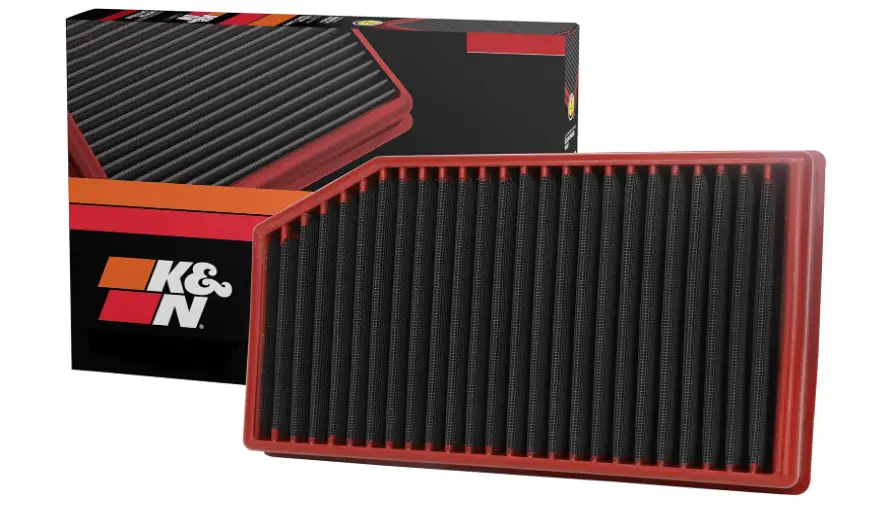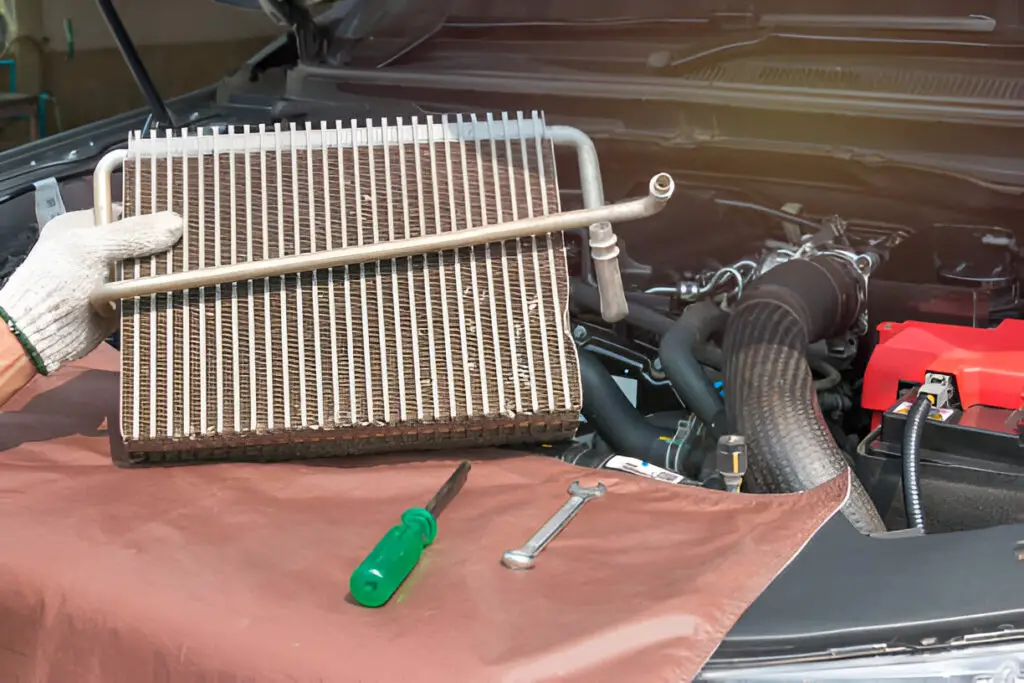You should generally change your engine air filter every 12,000 to 15,000 miles or once a year, depending on your driving conditions. In dusty or off-road environments, it may need replacement more frequently, around every 6,000 to 10,000 miles.
Vehicle’s engine air filter plays a vital role in keeping the engine clean and operating efficiently. It prevents dust, dirt, and debris from entering the engine, which could otherwise cause serious damage over time. Regular maintenance of your car’s air filter is crucial, as a clogged or dirty filter can reduce performance, fuel efficiency, and even lead to long-term engine problems.
In this post, we’ll cover how often you should change your engine air filter, factors that influence this decision, the signs of a dirty air filter, the benefits of regular maintenance, and how to change it yourself. Additionally, we’ll answer five frequently asked questions about engine air filters.

Contents
How Often Should You Change Engine Air Filter?
The general recommendation is to replace your engine air filter every 12,000 to 15,000 miles or once a year, whichever comes first. However, this is a rough guideline, and the actual frequency depends on various factors such as your driving conditions, the environment, and the type of vehicle you own.
Here’s a more detailed breakdown of how certain factors influence the replacement schedule:
1. Driving Conditions
- Urban vs. Rural Driving: If you mostly drive in urban areas with smooth, paved roads, your air filter will likely last longer because there is less dust and debris. Conversely, if you drive on rural or dirt roads, your engine is more exposed to dust and contaminants, necessitating more frequent filter replacements.
- Off-Road Driving: Off-roading subjects your vehicle to dust, sand, and mud, which can quickly clog the air filter. Off-road enthusiasts should check their filters more often and may need to change them every 6,000 to 10,000 miles.
- High-Traffic Areas: If you drive in congested areas with frequent stops, the air filter can get dirty quicker due to the concentration of exhaust fumes and particulate matter in the air.
2. Environmental Conditions
- Dusty Environments: If you live in a desert or an area with a lot of airborne particles, the air filter will become clogged faster. In such conditions, it may need to be replaced every 5,000 to 10,000 miles.
- Seasonal Factors: Pollen, leaves, and other seasonal factors may affect how quickly your air filter gets dirty. For instance, in the spring, when pollen counts are high, your air filter may get clogged sooner.
3. Vehicle Usage
- Heavy-Duty vs. Light-Duty Vehicles: Heavy-duty vehicles like trucks or those used for towing may require more frequent air filter changes than smaller, light-duty vehicles.
- Older vs. Newer Models: Older car models tend to have less efficient filtration systems compared to newer ones, which means you might need to change the filter more often if you have an older vehicle.
4. Type of Air Filter
- Paper Filters: Most vehicles come equipped with paper air filters, which are relatively inexpensive and should be replaced every 12,000 to 15,000 miles.
- Cotton or Foam Filters: Some aftermarket air filters are made from cotton or foam and are reusable. These filters can be cleaned and re-oiled, extending their life. However, they still need to be checked regularly and may require cleaning every 10,000 miles.

When to Replace Engine Air Filter
It’s essential to recognize the signs that your air filter is dirty or clogged, even if you haven’t yet reached the recommended mileage for replacement. Here are common indicators that it’s time to change your air filter:
1. Reduced Fuel Efficiency
A clogged air filter can reduce your vehicle’s fuel efficiency. When the engine doesn’t get enough clean air, it has to work harder, which consumes more fuel. If you notice a sudden drop in miles per gallon (MPG), it could be a sign that your air filter is dirty.
2. Decreased Engine Performance
If the engine feels sluggish, or if you notice a lack of acceleration, your air filter may be the culprit. Insufficient airflow can make it harder for your engine to produce the power it needs, especially during acceleration.
3. Black Smoke from the Exhaust
A dirty air filter can cause fuel to not burn completely, resulting in black smoke or soot coming from the exhaust. This is a clear sign that the engine is struggling to maintain the correct air-to-fuel ratio.
4. Engine Misfires
A clogged air filter may also cause engine misfires, especially during ignition. The insufficient airflow disrupts the combustion process, leading to rough idling or difficulty starting the engine.
5. Check Engine Light
In some cases, a dirty air filter can trigger the “Check Engine” light on the dashboard. This happens because restricted airflow affects the air-fuel balance, causing the engine’s sensors to detect an issue.
6. Dirty Appearance
If you remove the air filter and it looks clogged with dust, dirt, or oil, it’s time to replace it. A quick visual inspection can help determine if it’s dirty enough to warrant a replacement.
Benefits of Regular Air Filter Replacement
Keeping up with air filter maintenance offers several advantages:
1. Improved Fuel Efficiency: A clean air filter ensures optimal airflow to the engine, improving combustion and allowing your vehicle to operate more efficiently. This can result in savings on fuel costs over time.
2. Enhanced Engine Performance: Replacing the air filter regularly can restore lost power and acceleration. A properly functioning air filter allows the engine to breathe freely, leading to smoother operation.
3. Prolonged Engine Life: Dirt and debris in the engine can cause premature wear and tear on engine components. A clean air filter keeps harmful particles out, helping to extend the life of your engine.
4. Reduced Emissions: A clogged air filter can lead to incomplete combustion, resulting in higher emissions. By changing the air filter, you ensure cleaner combustion and reduced environmental impact.
5. Lower Repair Costs: Neglecting your air filter can lead to more severe engine issues, which may require costly repairs. Regularly changing the air filter is a simple, inexpensive maintenance task that can prevent more significant problems down the line.
Frequently Asked Questions
Here are some FAQs about engine air filters –
1. How can I tell if my air filter needs to be replaced?
The most obvious sign is a dirty or clogged appearance. However, you might also notice a drop in fuel efficiency, reduced engine performance, black smoke from the exhaust, or even a “Check Engine” light.
2. Can I clean my air filter instead of replacing it?
It depends on the type of air filter. Some filters, like cotton or foam ones, are reusable and can be cleaned. However, most paper filters are designed for single use and should be replaced when dirty.
3. What happens if I don’t change my air filter?
If you neglect to change your air filter, it will become clogged with dirt and debris. This can lead to reduced engine performance, lower fuel efficiency, increased emissions, and even long-term engine damage.
4. Does the cabin air filter and engine air filter serve the same purpose?
No. The cabin air filter filters the air that enters your car’s interior through the HVAC system, while the engine air filter cleans the air going into the engine for combustion.
5. How much does it cost to replace an engine air filter?
The cost can vary depending on the type of vehicle and filter. Typically, a new air filter costs between $20 and $50, and if you have it replaced at a shop, labor might add $30 to $60 to the total cost.
Conclusion
Changing your engine air filter is a crucial part of vehicle maintenance that helps ensure your engine runs efficiently and lasts longer. Depending on your driving conditions and environment, you may need to replace it more or less frequently than the recommended 12,000 to 15,000 miles. By staying vigilant and addressing signs of a clogged filter, you can avoid costly repairs and keep your vehicle in top shape.
With regular checks and timely replacements, you can ensure that your vehicle remains fuel-efficient, eco-friendly, and performs at its best.